(In 2009 I wrote a two-week series of blog posts about post-apocalyptic novels & films for Borders’ blog. Because this subgenre has continued to flourish, I am reprinting the posts here.)
Finishing my list of postapocalyptic books I think are standouts in the field. Tomorrow we’ll cover movies. Then we’ll get to the nitty gritty.
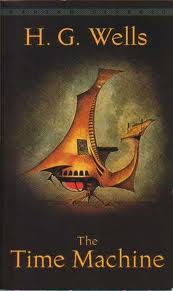 The Time Machine, H.G. Wells. So often considered as a time-travel classic that it’s easy to forget that this timeless (yuck yuck) novel of social darwinism gone awry gave us the innocent and inept Eloi living clueless in the ruins of their ancestors in the year 802,701, preyed upon by the steampunkish Morlocks, who are maintaining a remnant of civilization apparently by rote. Wells’ unnamed narrator moves even further through time to witness the death of the earth itself, cold beneath an ember sun, as the last living thing stops moving on a barren redlit beach. Wells accomplished all of this in about 60,000 words, too. Amazing book.
The Time Machine, H.G. Wells. So often considered as a time-travel classic that it’s easy to forget that this timeless (yuck yuck) novel of social darwinism gone awry gave us the innocent and inept Eloi living clueless in the ruins of their ancestors in the year 802,701, preyed upon by the steampunkish Morlocks, who are maintaining a remnant of civilization apparently by rote. Wells’ unnamed narrator moves even further through time to witness the death of the earth itself, cold beneath an ember sun, as the last living thing stops moving on a barren redlit beach. Wells accomplished all of this in about 60,000 words, too. Amazing book.
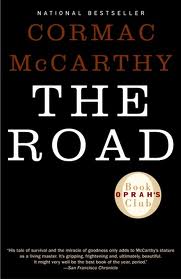 The Road, Cormac McCarthy. A boy bonds with his father on a trip to the beach! It doesn’t get any simpler than this: Years after an unspecified apocalypse has destroyed virtually all life on earth (implicitly not all at once but through a chain reaction of ecosystem cascade failure following some global trauma), a father tries to protect his son as they journey toward the ocean and the forlorn hope of community and life. McCarthy reverts to Hemingway minimalism mode (think The Dead Man and the Sea) for this gloriously despairing slog through a bleak devastated landscape. McCarthy never explains his apocalypse, which drives SF purists crazy. Good for him. McCarthy is the most fearless writer in America right now, and arguably our best prose stylist. That he is also commercially popular continues to astonish me, and reinforces my cynical belief that people pretty much read at the level of event and notice little else. I’m perfectly willing to be persuaded I’m wrong.
The Road, Cormac McCarthy. A boy bonds with his father on a trip to the beach! It doesn’t get any simpler than this: Years after an unspecified apocalypse has destroyed virtually all life on earth (implicitly not all at once but through a chain reaction of ecosystem cascade failure following some global trauma), a father tries to protect his son as they journey toward the ocean and the forlorn hope of community and life. McCarthy reverts to Hemingway minimalism mode (think The Dead Man and the Sea) for this gloriously despairing slog through a bleak devastated landscape. McCarthy never explains his apocalypse, which drives SF purists crazy. Good for him. McCarthy is the most fearless writer in America right now, and arguably our best prose stylist. That he is also commercially popular continues to astonish me, and reinforces my cynical belief that people pretty much read at the level of event and notice little else. I’m perfectly willing to be persuaded I’m wrong.
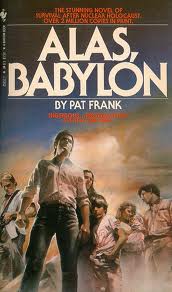 Alas, Babylon, Pat Frank. Somewhat dated now, Frank’s 1959 novel of a Florida community struggling to survive the aftermath of a nuclear war was one of the first in a long line of “survivalist” postapocalyptic novels in the public conscience. Written in the shadow of the sword of Damocles that hung over an entire generation that felt fairly certain it was going to end up reduced to breathable material, this isn’t a book about politics or social darwinism, it’s a book about trying to have hot water again. That the community is “reduced” to the circumstances of probably half the global population speaks to the appeal of postapocalyptic works in general: Horror for the comfortable is the loss of comforts. What is most interesting about Alas, Babylon is precisely that its characters’ struggles are much less interesting when considered apart from the aftermath of nuclear war — take away the bombs and it’s basically The Mosquito Coast – but that reduction colors everything, and fueled an entire subgenre for decades.
Alas, Babylon, Pat Frank. Somewhat dated now, Frank’s 1959 novel of a Florida community struggling to survive the aftermath of a nuclear war was one of the first in a long line of “survivalist” postapocalyptic novels in the public conscience. Written in the shadow of the sword of Damocles that hung over an entire generation that felt fairly certain it was going to end up reduced to breathable material, this isn’t a book about politics or social darwinism, it’s a book about trying to have hot water again. That the community is “reduced” to the circumstances of probably half the global population speaks to the appeal of postapocalyptic works in general: Horror for the comfortable is the loss of comforts. What is most interesting about Alas, Babylon is precisely that its characters’ struggles are much less interesting when considered apart from the aftermath of nuclear war — take away the bombs and it’s basically The Mosquito Coast – but that reduction colors everything, and fueled an entire subgenre for decades.
 Mockingbird, Walter Tevis. The author of The Hustler was also an underappreciated SF writer who turned in a haunting, poetic postapocalyptic novel about a feckless, illiterate humanity reduced to tranquilized uselessness as they are protected by robot caretakers who were programmed a little too well. Here Tevis explores what it might be like to become the Eloi from the inside, and at the same time he turns in what might be the only novel ever written about the end of humanity due to illiteracy. Tevis’ android supervisor Spofforth is a singular creation and one of my favorites in SF. Inexcusably out of print.
Mockingbird, Walter Tevis. The author of The Hustler was also an underappreciated SF writer who turned in a haunting, poetic postapocalyptic novel about a feckless, illiterate humanity reduced to tranquilized uselessness as they are protected by robot caretakers who were programmed a little too well. Here Tevis explores what it might be like to become the Eloi from the inside, and at the same time he turns in what might be the only novel ever written about the end of humanity due to illiteracy. Tevis’ android supervisor Spofforth is a singular creation and one of my favorites in SF. Inexcusably out of print.
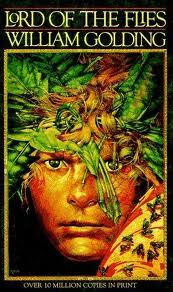 Lord of the Flies, William Golding. This may seem a weird choice in a list of postapocalyptic fiction, but I think apocalypse and the nature of humanity were very much on Golding’s mind when he published this 1954 masterpiece. A group of schoolboys survives a planecrash on an island. Unsupervised and unfettered by social constraint, they reenact the Scene Primeval in miniature, and the book is essentially a meditation on the artificiality of the veneer of civilization and what we are when we shed it (though I’d offer up that one of the things we are is creatures that eventually build civilizations) — the grist for postapocalyptic fiction’s mill. Making war is part of our innate ape heritage to Golding (who also wrote, tellingly, The Inheritors, about early hominids), and the inescapability of this even after we become “civilized” is beautifully brought home when the boys are finally rescued by a navy cruiser — a warship (a detail apparently lost on a great many readers & critics).
Lord of the Flies, William Golding. This may seem a weird choice in a list of postapocalyptic fiction, but I think apocalypse and the nature of humanity were very much on Golding’s mind when he published this 1954 masterpiece. A group of schoolboys survives a planecrash on an island. Unsupervised and unfettered by social constraint, they reenact the Scene Primeval in miniature, and the book is essentially a meditation on the artificiality of the veneer of civilization and what we are when we shed it (though I’d offer up that one of the things we are is creatures that eventually build civilizations) — the grist for postapocalyptic fiction’s mill. Making war is part of our innate ape heritage to Golding (who also wrote, tellingly, The Inheritors, about early hominids), and the inescapability of this even after we become “civilized” is beautifully brought home when the boys are finally rescued by a navy cruiser — a warship (a detail apparently lost on a great many readers & critics).
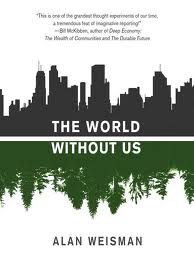 The World Without Us, Alan Weisman. This nonfiction book by journalist Alan Weisman seems weirdly to have been written specifically for me, as it surveys what would happen to the world were humanity to suddenly vanish — essentially the premise of Ariel and Elegy Beach (Weisman wisely elects not to wonder what would happen if magic were suddenly possible and formerly mythological creatures were present, though.) This book was astoundingly well-timed, occurring as essentially a reference work just as post-apocalyptic scenarios were sprouting up across all media. A must-read for anyone considering writing about human beings going bye-bye to any significant degree.
The World Without Us, Alan Weisman. This nonfiction book by journalist Alan Weisman seems weirdly to have been written specifically for me, as it surveys what would happen to the world were humanity to suddenly vanish — essentially the premise of Ariel and Elegy Beach (Weisman wisely elects not to wonder what would happen if magic were suddenly possible and formerly mythological creatures were present, though.) This book was astoundingly well-timed, occurring as essentially a reference work just as post-apocalyptic scenarios were sprouting up across all media. A must-read for anyone considering writing about human beings going bye-bye to any significant degree.
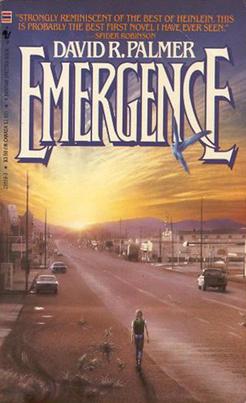 Emergence, David Palmer. Palmer’s first novel is a bravura tour de force starring one Candy Smith-Foster, 12-year-old homo post hominem supergenius who survives the end of everything by hiding in her father’s bomb shelter, emerging with her pet parrot Polly to learn how to survive in the emptied world until finally setting out to find others of her own kind. Candy writes in Pitman shorthand, and the book is a blow-by-blow recounting in truncated, telegrapher style (tellingly, Palmer is a court reporter) that shouldn’t work but succeeds gloriously. The wheels come off the storyline by the end, but until that point the novel’s detail and setpieces are wonderfully depicted, and Candy herself is a memorable voice in SF. Palmer is reportedly finishing a sequel (and, David, have fun with the emails you get when you publish a sequel a quarter-century after the original. I know whereof I speak). It’s a tragedy that this book is out of print. Are you listening, SF publishers?
Emergence, David Palmer. Palmer’s first novel is a bravura tour de force starring one Candy Smith-Foster, 12-year-old homo post hominem supergenius who survives the end of everything by hiding in her father’s bomb shelter, emerging with her pet parrot Polly to learn how to survive in the emptied world until finally setting out to find others of her own kind. Candy writes in Pitman shorthand, and the book is a blow-by-blow recounting in truncated, telegrapher style (tellingly, Palmer is a court reporter) that shouldn’t work but succeeds gloriously. The wheels come off the storyline by the end, but until that point the novel’s detail and setpieces are wonderfully depicted, and Candy herself is a memorable voice in SF. Palmer is reportedly finishing a sequel (and, David, have fun with the emails you get when you publish a sequel a quarter-century after the original. I know whereof I speak). It’s a tragedy that this book is out of print. Are you listening, SF publishers?
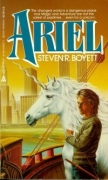 Worth mentioning here is the terrific Jim Burns cover for the paperback original. When Emergence was published I was insanely jealous, as it was exactly the cover I’d imagined for Ariel. Then Ariel was published with its own glorious Barclay Shaw cover and I wasn’t jealous anymore. Even more synchronistically, David and I knew each other in Gainesville, Florida, when our first novels were published. Oooh-WEEEEE-oooooh.
Worth mentioning here is the terrific Jim Burns cover for the paperback original. When Emergence was published I was insanely jealous, as it was exactly the cover I’d imagined for Ariel. Then Ariel was published with its own glorious Barclay Shaw cover and I wasn’t jealous anymore. Even more synchronistically, David and I knew each other in Gainesville, Florida, when our first novels were published. Oooh-WEEEEE-oooooh.
There are some “classics” in the field that I’ve left out of this list because, frankly, they didn’t work for me. If after-the-fall books are your cup of tea (and, golly, why wouldn’t they be?), you undoubtedly have a list of your own fave raves. Feel free to share — you can’t get enough of the end of the world.
a feckless, illiterate humanity reduced to tranquilized uselessness as they are protected by robot caretakers who were programmed a little too well.
Funnily enough, this description could easily be used for Don’t Bite the Sun by Tanith Lee, which is pretty much my favorite novel in the history of the written word. (Though ‘illiterate’ doesn’t quite match–in the sequel, Drinking Sapphire Wine, the narrator describes reading ancient texts in a rarely used library, and this knowledge leads to a chain of events that results in the narrator’s exile from civilization.)